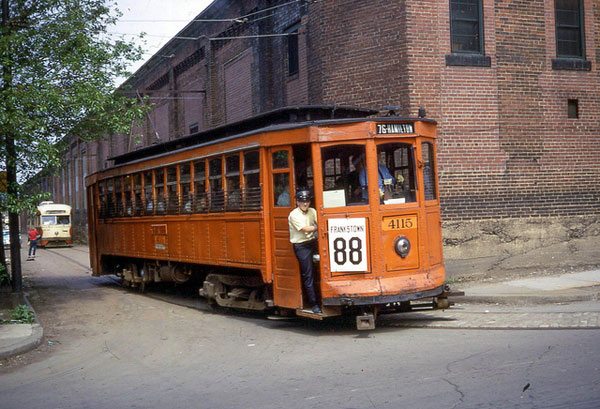
February 27, 2018; Pittsburgh City Paper
Pittsburgh is often praised for its economic performance, but when it comes to racial equity, the city has a long way to go. In a 2017 report from the National Urban League, Pittsburgh ranked 65th in black-white income inequality out of 71 metro communities. Writing in Pittsburgh City Paper, Sabrina Bodon remarks that, “Within the city, predominantly black neighborhoods lack thriving business districts and other basic services found in other neighborhoods.”
Bodon profiles the Pittsburgh Black Elected Officials Coalition (PBEOC), a group hoping to change that. “Since its establishment two years ago,” Bodon writes, “the PBEOC has embarked on collecting recommendations from the community, and throughout the process, an overwhelming majority of constituents called for business and organizational development reform as a top priority.” The group met with community members earlier this week in Pittsburgh’s Homewood neighborhood, where discussion centered on how to establish initiatives that would foster the development of a stronger Black business community.
In the group’s “Phase I” report, Jake Wheatley (D-Hill District) explains the group’s origins: “Five elected officials, City Councilman Reverend Ricky Burgess, State Representative Ed Gainey, City Councilman Daniel Lavelle, County Councilman DeWitt Walton and myself decided to come together, to put our differences aside, and to…create a collective table whereby we would leverage our collective power and authority to make transformational policy and legislative decisions that would improve Pittsburgh’s African American and impoverished neighborhoods. With this decision, the Pittsburgh Black Elected Officials Coalition was born.”
The Coalition has offered two reports so far. The Phase I report involved meeting with “400 constituents in six neighborhoods.” These meetings resulted in more than 300 recommendations. “During the second phase,” Bodon explains, “85 residents prioritized the recommendations [made in phase I] with a critical eye toward public safety, affordable housing, family outcomes, businesses, education, and employment.”
Sign up for our free newsletters
Subscribe to NPQ's newsletters to have our top stories delivered directly to your inbox.
By signing up, you agree to our privacy policy and terms of use, and to receive messages from NPQ and our partners.
The role that nonprofits and foundations can play in fostering development was one key area of the discussion. Coalition members expressed appreciation for the efforts of nonprofits, but also, as Bodon notes, “wanted to make sure Black entrepreneurs weren’t overly reliant on area nonprofits.” Mark Lewis, president and CEO of the POISE Foundation, a nonprofit that distributes funds from other local foundations groups throughout the Black community, said that, “Pittsburgh is blessed and cursed” by its strong nonprofit sector. The challenge, Lewis added, is to use nonprofit funds wisely to develop a strong system of supports, without placing the businesses that emerge inadvertently in a position of grant dependency.
Pittsburgh is known for its strong nonprofit community. The Heinz Endowments and the Pittsburgh Foundation both support community economic development efforts. The city is also home to nationally respected nonprofits such as Manchester Bidwell, an education and training center started by Bill Strickland that has been a model for many cities, and Urban Innovation 21, a local business support nonprofit. Bill Generett, Urban Innovation 21’s first executive director, who left last year after ten years at the helm, has noted that “Although the region has made some strides in including more diverse communities in the new economy…there is more to be done.” Generett added, “Doing inclusionary work in Pittsburgh is like pushing the boulder up the hill.”
In the coalition’s “Phase 2” report, community recommendations for business development are extensive. A few that are described as being of “great impact and hardest to accomplish” include:
- Replicate best practices from other low-income communities.
- Work with the research community to develop proxy measures for barriers to financial equity to build the knowledge base on these important barriers to financial equity
- Generate greater government support for vendor training and support of startup & small businesses.
- Utilize youth workforce initiatives sponsored by agencies, schools, community and/or faith-based organizations that provide education, training, internships, apprenticeships, and/or employment.
Each recommendation also identifies an organization that is expected to lead on implementation. Politicians and business organization representatives attending indicated their support for the community goals. Bodon writes that, “Regional business-coalition Allegheny Conference CEO Stefani Pashman said her group is committed to increasing the number of Black businesses participating in the region’s corporate supply chain. Pittsburgh Mayor Bill Peduto was also in attendance and showed support for business-supporting strategies like providing fiscal sponsorship that would raise money to grow and promote the Black community.”
Maxwell King, CEO of the Pittsburgh Foundation, remarked that, “We’re 100 percent committed to the [Pittsburgh economic] renaissance, but if 100 percent of the people don’t participate in this, then it’s a failure.” King cautioned that currently there were still “30 to 40 percent of people in this region are not participating.”
Walter Lewis, interim president of Homewood Children’s Village, closed with a call for the community to hold leaders accountable. Lewis said residents must make sure that community leaders uphold their promises. “Our piece as citizens is to pay attention,” Lewis concluded.—Steve Dubb













